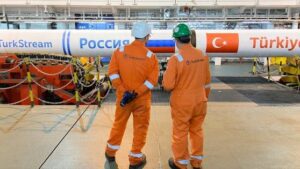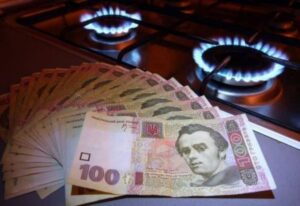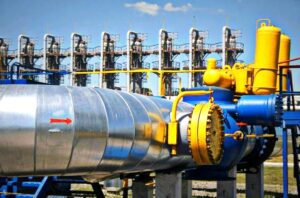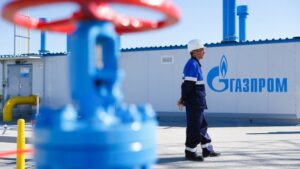
Turkey is continuing negotiations with Gazprom on the bulk of contracts for gas supply to the country through the Turk Stream pipeline, Turkish Deputy Energy and Natural Resources Minister Alparslan Bayraktar told reporters.
“We are in talks with Gazprom to increase gas supplies to Turkey because there is a free, uncontracted capacity of 9.75 billion cubic meters of gas in Turk Stream. The contracts expire this year, so there will be such spare capacity in Turk Stream in 2022. We’re talking about new contracts, renewal of some contracts, we are negotiating, I cannot say anything more at this stage,” he said.
He admitted that the situation with Russian gas supplies was complicated by the problem of private importer companies: “The real problem with private importers is arbitration – they offered a discount, then won the arbitration, so private importers suffered.”
“‘Gazprom needs to understand the needs of the domestic market, because today the price of gas is quite important, and it is not easy to increase the price of gas for the population, no one wants to pay more,” the Turkish official added.
“I think Gazprom wants to sell more gas to Turkey, Turkey needs gas, so it’s a ‘perfect alliance.’ Turkey is a growing market, gas consumption is growing, I think Gazprom has the capacity to supply gas to both Turkey and Europe, we have the infrastructure, enough gas pipelines, so I don’t see any problem,” Bayraktar said.
Gas consumption in Turkey is expected to rise to a record 60 billion cubic meters in 2021.
In 2015, Gazprom granted a discount of 10.25% to private Turkish importers, but a year later demanded its cancellation. Claims against Akfel Gaz, Bat Hatt, Kibar Enerji, Avrasya Gaz, and Enerco Enerji were filed with the Arbitration Institute of the Stockholm Chamber of Commerce and arbitration in accordance with UNCITRAL regulations. The arbitration bodies cancelled the discounts for private companies as of January 1, 2017. Failure or difficulty in enforcing the arbitration court ruling in Gazprom’s dispute with Turkish private importers is holding back Russian gas supplies to the country. As a result, some of the former private buyers may not participate in negotiations on new contracts and may be replaced by other importers.
Since the beginning of the 2000s, Turkey has embarked on a liberalization of the natural gas market, under which most of the contracts of state-owned Botas have been reassigned to private importers. However, after a failed coup attempt in 2016, Law N674, “On Measures Under the State of Emergency Regime,” was passed, and external management was imposed on these companies by the state Savings Deposit Insurance Fund (TMSF), which effectively meant nationalization.

Gazprom (MOEX: GAZP) has declined to book additional transit capacity via Ukraine and Poland for Q1 2022, according to the results of booking auctions on GSA Platform and Regional Booking Platform.
Gazprom has been refraining from long-term bookings this year, preferring mostly monthly contracts.
Liberalization of the European gas market has resulted in the rejection of long-term transit agreements. Transparent auction bookings have replaced the long-term agreements in order to eliminate excess booking costs from the gas price. Consequently, those shipping gas are free to book only their required capacity amount, and for the time when the capacity would be necessary.
UKRAINE
Gas Transmission System Operator of Ukraine distributed the proposed capacity along two routes, with 9.8 million cubic meters per day offered at the Sudzha gas-measuring station, and an additional 5.2 million cubic meters per day offered at the Sokhranovka gas-measuring station, though they were unclaimed.
Gazprom has a long-term booking of Ukrainian capacities totaling 40 billion cubic meters, which is 109 million cubic meters per day.
POLAND
Gazprom also did not book any capacity via the Polish section of the Yamal-Europe gas pipeline for the first quarter of 2022. The 2,000-km Yamal-Europe gas pipeline has the capacity to pump up to 33 billion cubic meters per year. The EuRoPol Gaz joint venture owns Poland’s 683-km section of the pipeline, and the national gas transmission operator Gaz-System operates the pipeline. Gazprom’s long-term contract for transit via Poland ended a year ago, with capacity since then being allocated based on auction bookings. For the gas year from October 2020 to September 2021, Gazprom booked capacity at an annual auction. The company then booked part of the pipeline’s capacities at monthly auctions.

The price of the nearest (November) futures for TTF on the ICE Futures exchange on Wednesday afternoon reached 161 euros per MWh, or $1,924/1,000 cubic meters, according to exchange data.
Only this morning, the price of November futures topped $1,500/1,000 cubic meters.
All in all, the average value of the day-ahead contract at the TTF hub in the Netherlands, Europe’s main gas platform, was $759/1,000 cubic meters in September.
Europe, with a general shortage of gas supplies (by pipeline and in liquefied form), is being forced to compete for LNG with the premium Asian market.
Gas prices in Europe have recently had had an inextricable impact on Gazprom share prices.

Gazprom is boosting gas pumping via Ukraine’s gas transmission system and is likely to exceed its contract obligations, but it will not be profitable to increase pumping even further, Russian President Vladimir Putin said during a meeting on the development of the energy sector.
“We are seeing all kinds of speculation on the topic of Ukraine’s gas transmission system, on supplies through it; I would also like to note that here now. Our contact obligations for supplies through Ukraine’s gas transmission system are 40 billion cubic meters of gas per year, and in 9M this year, Gazprom increased these supplies, this pumping, to be more precise, through the Ukrainian transmission system more than 8%. We can say with confidence that we will exceed our contract obligations for gas supplies through the territory of Ukraine. It is unprofitable for Gazprom to increase them further, because it is more expensive. Pumping through the new systems is significantly cheaper, by around $3 billion per year against corresponding supply volumes,” Putin said.

Gazprom has booked all offered firm additional transit capacities through Ukraine for August, according to the results of the monthly Regional Booking Platform auction.
Gazprom reserved extra capacities for August via RBP on Monday. The Russian gas company requested all of the 15 million cubic meters per day offered. The outcome of the auction was the same in the previous months.
Given that 100% of the offered firm capacities were sold at the auction, an additional one could be announced in the near future, for interruptible capacities, whose fulfilment depends on the technical capabilities of the gas transportation operator. This auction will likely take place on July 27.
Ukrainian gas companies already usually refer to Gazprom’s reluctance to buy non-guaranteed capacities – which are normally offered at a discount – at a guaranteed price as blackmailing Europe. However, the ratio of firm and interruptible gas transportation capacities remains the same at 19% and 81%, respectively.
Although preventive maintenance work is taking place on the Nord Stream and Yamal-Europe Russian export gas pipelines in July, Gazprom declined to increase its booking of Ukrainian gas transportation capacities, offsetting the fall in transit by withdrawing gas from storage facilities in Europe.
Gazprom has a long-term reservation of Ukrainian capacities in the volume of 40 billion cubic meters for 2021, which is equal to 109 mcm per day. With the additional 15 mcm booked at auction, this amounts to 124 mcm per day. The company is pumping 124 mcm per day on average through Ukraine in July, fully using the volume booked.

Gazprom (MOEX: GAZP) has again refused to book additional transit capacity via Ukraine for July despite the upcoming major repairs on export gas pipelines, according to data of the Regional Booking Platform.
Gas Transmission System Operator of Ukraine LLC on Tuesday put up for auction additional interruptible transit capacities for July totaling 63.7 million cubic meters per day, which were fully unclaimed.
Russia’s state-owned gas company has a long-term booking capacity of 40 billion cubic meters via Ukraine for 2021 at 109 million cubic meters per day, having booked an additional 15 million cubic meters per day at the June 21 auction for a total of 124 million cubic meters per day. Gazprom in June has been pumping an average of 124 million cubic meters per day via Ukraine at the fully booked volume.
When an auction for solid capacities is 100% sold, then an auction for interruptible capacities may be organized depending on the capabilities of the gas transmission system operator.
Gazprom earlier this year did not book interruptible capacities during the auctions held for May and June. However, major repairs are scheduled for July along the concern’s main export trunklines. For example, Nord Stream, which pumps 170 million cubic meters per day, is scheduled for annual maintenance from July 13 to 23; and Yamal-Europe, which pumps around 100 million cubic meters per day, is scheduled for maintenance from July 6 to 10.
The balance of the European gas market is becoming increasingly tense because of the unusual seasonal regularity of falling LNG supplies, and supplies of pipeline gas are decreasing owing to scheduled repairs. Pumping of gas into underground storage facilities is at minimum levels, leaving little doubt that Europe could begin the new winter season with half-empty UGS facilities.